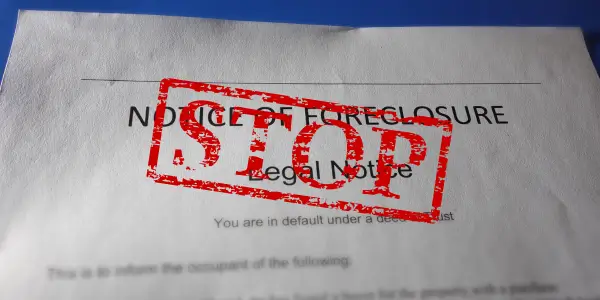
Table of Contents
- Can I Stop a Foreclosure by Paying the Past Due Amount?
- An Overview of Foreclosure
- Top Reasons Homeowners Face Foreclosure
- Can You Stop Foreclosure by Paying the Past Due Amount?
- Know Your Rights and Protections When Facing Foreclosure
- Challenges and Risks of Stopping Foreclosure
- Proactive Strategies to Avoid Foreclosure
- Conclusion
- Frequently Asked Questions
Can You Stop a Foreclosure by Paying the Past Due Amount?
Yes, you can often stop a foreclosure by paying the past-due amount, including late fees and penalties. This process, called reinstatement, brings your loan current and typically halts the foreclosure as long as payment is made before the sale date. Lenders usually prefer receiving the missed payments over going through the costly and time-consuming foreclosure process. However, timing is critical, waiting too long can limit your options, and once the property is scheduled for auction, it may be too late to catch up.
But what if you simply can’t afford the mortgage anymore? That’s where we can step in. Instead of drowning in debt or losing your home to foreclosure, we offer a fast, stress-free way to sell your house as-is and walk away with cash in hand. No repairs, no waiting, and no more sleepless nights worrying about the bank. With our simple three-step process, you can take control of your situation, avoid foreclosure, and get a fresh start.
Get An Offer Today & Pick Your Close Date
Fill Out the Form and Our Team Will Call With Your Offer
An Overview of Foreclosure
Defining Foreclosure
Foreclosure is the legal process a lender starts when a homeowner stops making their mortgage payments. It allows the lender to either take back ownership of the property or sell it, often through an auction, to recover the money they’re owed.
Foreclosure doesn’t just mean losing a home, it can also seriously harm the homeowner’s credit, making it harder to qualify for loans or rent in the future. The process follows specific rules and timelines that vary by state, with steps like legal notices and deadlines that homeowners need to pay attention to.
While foreclosure is a serious situation, it’s not always the only option. Homeowners may be able to work out solutions like modifying their loan, setting up a payment plan, or selling the house as-is to avoid the long-term effects.

Stages of Foreclosure
Foreclosure is a multi-step process, and understanding its stages can help homeowners act promptly:
| 1. Pre-Foreclosure | Begins when a homeowner misses payments. Lenders typically issue a warning or notice of delinquency. |
| 2. Notice of Default | The lender issues a formal notification that foreclosure proceedings may begin if payments aren’t made. |
| 3. Auction | If the debt remains unpaid, the property is sold at a public auction. |
| 4. Post-Foreclosure | The lender repossesses the home if no buyer emerges at the auction. The property may be sold to recover the mortgage balance. |
Top Reasons Homeowners Face Foreclosure
1. Financial Setbacks
Life’s unexpected challenges, such as job loss, mounting medical bills, or the financial strain of a divorce, can severely impact a homeowner’s ability to make regular mortgage payments. Without sufficient financial reserves, these situations can quickly escalate, leaving homeowners struggling to keep up with their loan obligations.
2. Adjustable-Rate Mortgages (ARMs)
While ARMs often start with lower, enticing interest rates, they can become a ticking time bomb for many homeowners. When interest rates rise, monthly payments can spike, making previously manageable loans unaffordable. Without timely refinancing or loan modifications, missed payments can pile up and lead to foreclosure.
3. Unexpected Financial Emergencies
Unexpected costs like major home repairs, medical emergencies, or other surprise expenses can derail even the most carefully planned budgets. When funds are redirected to cover urgent needs, mortgage payments often fall behind, pushing homeowners closer to foreclosure.
Can You Stop Foreclosure by Paying the Past Due Amount?
Reinstatement: The Process of Stopping Foreclosure
Reinstatement involves bringing your mortgage current by paying all past due amounts in a single payment. This option can stop foreclosure proceedings immediately and allow you to retain your home.
How to Calculate the Past Due Amount
Your reinstatement amount typically includes:
- Missed Payments: Principal and interest for all overdue payments.
- Late Fees: Charges incurred for failing to meet deadlines.
- Legal Fees: Costs incurred by the lender during foreclosure proceedings.
- Escrow Deficits: Any unpaid property taxes or insurance premiums.

Timeframe for Reinstatement
Most lenders allow reinstatement up until a specific point, typically before the foreclosure sale. Deadlines can vary by state, so consult your mortgage agreement and local laws to ensure compliance.
Accepted Payment Methods
- Certified checks, cashier’s checks, or wire transfers are commonly required to expedite the process.
- Personal checks are often not accepted due to potential delays in clearance.
Get An Offer Today & Pick Your Close Date
Fill Out the Form and Our Team Will Call With Your Offer
Alternatives if You Can’t Pay the Full Past Due Amount
If paying the full past due amount isn’t feasible, there are several alternatives to explore:
1. Negotiate a Repayment Plan
Many lenders offer repayment plans that allow you to spread overdue payments across several months. For example, if you owe $6,000, the lender might add $500 to your monthly mortgage payment for 12 months to cover the arrears.
2. Apply for a Loan Modification
A loan modification restructures your mortgage terms to make payments more affordable. Common changes include:
- Reducing the interest rate.
- Extending the loan term.
- Rolling missed payments into the principal balance.

3. Request Forbearance
Forbearance temporarily suspends or reduces mortgage payments, giving you time to recover financially. However, the total missed payments will eventually need to be repaid, often in a lump sum or through a repayment plan. Find out how you can sell your house in forbearance.
4. Consider a Partial Reinstatement
Some lenders may accept partial payments as a good-faith effort to resolve the debt and delay foreclosure proceedings. This option requires clear communication and agreement with your lender.
5. Selling the House: One of the Best Options!
If the above options don’t work for your situation or if you’re looking for a clean slate, selling the house to avoid foreclosure can be one of the best solutions. Selling allows you to pay off the mortgage debt, avoid foreclosure, and protect your credit score. For those in time-sensitive situations, a cash sale can provide a quick and hassle-free resolution.
Know Your Rights and Protections When Facing Foreclosure
Dealing with foreclosure can feel overwhelming, but knowing your options and rights can help you take control of the situation. Here’s a breakdown of the key things to understand:
1. Foreclosure Rules Depend on Your State
Every state handles foreclosure differently. Here’s what you need to know:
- Judicial Foreclosure
In some states, the lender has to go through the courts to foreclose on your home. This process usually takes longer, giving you more time to respond or negotiate. - Non-Judicial Foreclosure
Other states allow lenders to foreclose without involving the courts. This process is faster, but you may have fewer chances to fight it.
If you’re facing foreclosure in Virginia, knowing your state’s specific rules and timelines is critical.
2. Federal Programs That Can Help
If your mortgage is backed by the federal government (like FHA, VA, or USDA loans), you might qualify for help:
- Temporary Payment Relief (Forbearance)
Programs like the CARES Act let you pause or lower your payments if you’re having financial trouble. - Help From HUD
The Department of Housing and Urban Development (HUD) offers programs to help you work out a payment plan or modify your loan so you can stay in your home.
Check if your mortgage is federally backed to see if you’re eligible.

3. You Might Still Be Able to Save Your Home After Foreclosure
In some states, you have a redemption period, which means you can buy back your home after the foreclosure sale. To do this, you’ll need to pay what you owe, including any fees, within a set amount of time.
This option isn’t available everywhere, so check your state’s laws to see if it applies to you.
4. When to Get Legal Help
If foreclosure feels like it’s moving too fast or you don’t understand your rights, a lawyer can help. Here’s how they can make a difference:
- Negotiate With Your Lender
They can work out a deal, like a loan modification or a repayment plan, to help you catch up. - Spot Mistakes
Sometimes lenders make errors during the foreclosure process. A lawyer can catch those mistakes and use them to your advantage. - Represent You in Court
If your case goes to court, an attorney can stand up for your rights and fight for the best outcome.
Foreclosure is tough, but you’re not powerless. Knowing your options and getting help when needed can make a big difference.
Challenges and Risks of Stopping Foreclosure
Learning how foreclosure works not only means knowing the process and options, it also important that homeowners are aware of the risks and challenges that comes with it. Here are some risks that every homeowner should look out for:
| Acting late can lead to ballooning costs, including additional interest, legal fees, and penalties. | |
| Even if foreclosure is stopped, missed payments and foreclosure filings negatively affect your credit score, making future borrowing more challenging. | |
| Without addressing the root cause of financial difficulties, there’s a higher likelihood of falling behind on payments again. |
Get An Offer Today & Pick Your Close Date
Fill Out the Form and Our Team Will Call With Your Offer
Proactive Strategies to Avoid Foreclosure
 Open Communication with Your Lender
Open Communication with Your Lender
Lenders are often willing to work with homeowners to find solutions. Tips for effective communication:
- Contact your lender as soon as financial issues arise.
- Provide a clear explanation and propose potential solutions.
 Utilize Housing Counseling Services
Utilize Housing Counseling Services
HUD-approved housing counselors can:
- Help you understand your options.
- Negotiate with lenders on your behalf.
- Provide budgeting advice to stabilize your finances.
 Refinance Your Loan
Refinance Your Loan
If you have equity and a stable income, refinancing your mortgage can lower monthly payments by securing a lower interest rate or extending the loan term.
 Create a Sustainable Budget
Create a Sustainable Budget
Develop a budget that prioritizes essential expenses and savings. Tools like financial apps or spreadsheets can help track income and expenditures.
 Additional Resources for Homeowners
Additional Resources for Homeowners
- HUD-Approved Housing Counseling Agencies: Free or low-cost guidance for homeowners facing foreclosure.
- Nonprofit Organizations: Groups like HOPE NOW and NACA offer foreclosure prevention resources.
- State Programs: Many states have foreclosure relief initiatives offering financial aid or legal assistance.
- Online Tools: Use calculators to assess your reinstatement amount or eligibility for loan modifications.
Conclusion
Stopping foreclosure by paying the past-due amount is possible, but time is of the essence. If you’re able to pay the overdue amount, that’s often the fastest way to stop foreclosure, but it’s important to act quickly and stay in touch with your lender. If paying it all at once isn’t possible, there are other options like loan modifications, temporary payment relief (forbearance), or setting up a repayment plan to help you catch up and keep your home.
By selling your house, especially for cash, you can quickly settle your financial obligations and avoid the long-term impacts of foreclosure on your credit. The most important thing is to act right away. The sooner you take action, the more choices you’ll have. Make sure to seek out professional guidance and reliable support to get advice that fits your situation.

Facing foreclosure is tough, but you don’t have to do it alone. With the right help and a clear plan, you can take control and move toward a more secure financial future.
Frequently Asked Questions
Can paying the past-due amount stop foreclosure, or is it too late?
Yes, paying the full past-due amount (missed payments, late fees, and legal costs) can stop foreclosure if it’s done before the lender’s deadline or auction date. This is called loan reinstatement, and timing is critical. Once the foreclosure sale happens, it’s usually too late unless your state allows a redemption period.
Do I have to pay fees, interest, and legal costs on top of my missed payments?
Yes, stopping foreclosure requires paying more than just your missed mortgage payments. Lenders usually add interest, late charges, and attorney or court fees to the reinstatement balance. These costs can make catching up harder, but they must be paid in full to halt foreclosure.
What happens if I can’t afford to pay the full past-due amount?
If you can’t pay the total reinstatement balance, foreclosure will continue unless you find another option. Alternatives include loan modifications, repayment plans, bankruptcy, or selling your house fast for cash. Many homeowners choose to sell quickly to avoid foreclosure and protect their credit.
Will paying the past-due amount fix my credit or just stop foreclosure?
Paying the past-due amount will stop foreclosure but it won’t erase the late payments already reported to credit bureaus. Your score may still drop, though it’s better than a completed foreclosure, which does more damage and stays longer. Reinstating your loan limits the harm, while selling before foreclosure may protect your credit further.
Still Have Questions? Visit our FAQ page.
Key Takeaways
- Question: “Can You Stop Foreclosure by Paying the Past Due Amount?” Paying past due amounts can temporarily stop foreclosure, but timely action is critical.
- Understanding the foreclosure process can provide clarity and options for homeowners.
- Seeking professional help can significantly ease the burden of navigating foreclosure.
When foreclosure is closing in, every day counts. Selling to 3 Step Home Sale means you can avoid losing everything and still have time to breathe. Thanks to our 30-Day Flex Stay™ program, we pay you in cash at closing and give you up to 30 days to move out with no pressure!
Sell Your House As-Is In:
Manassas | Richmond | Norfolk | Severna Park | Bowie | Waldorf

